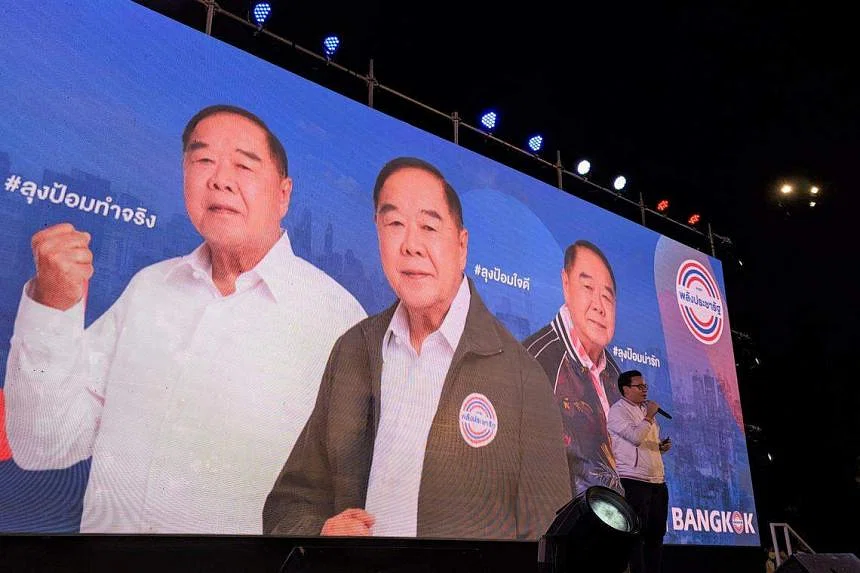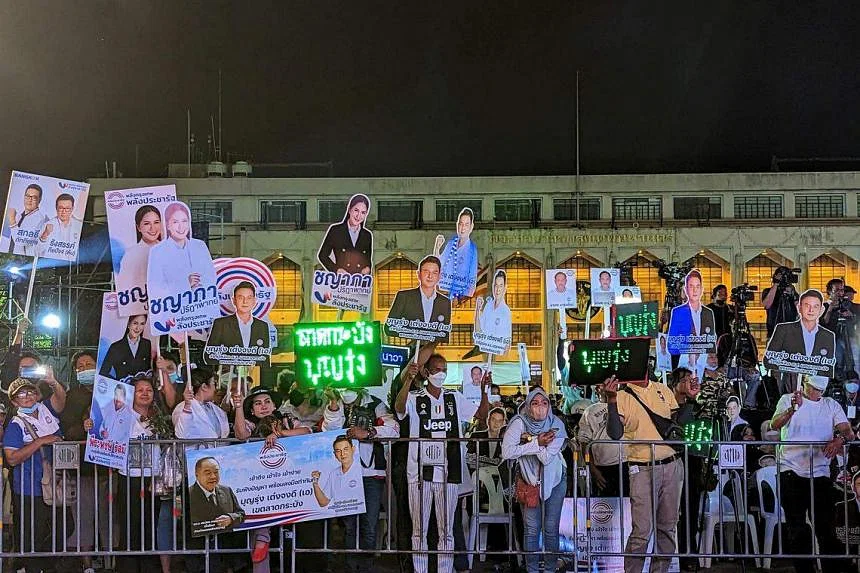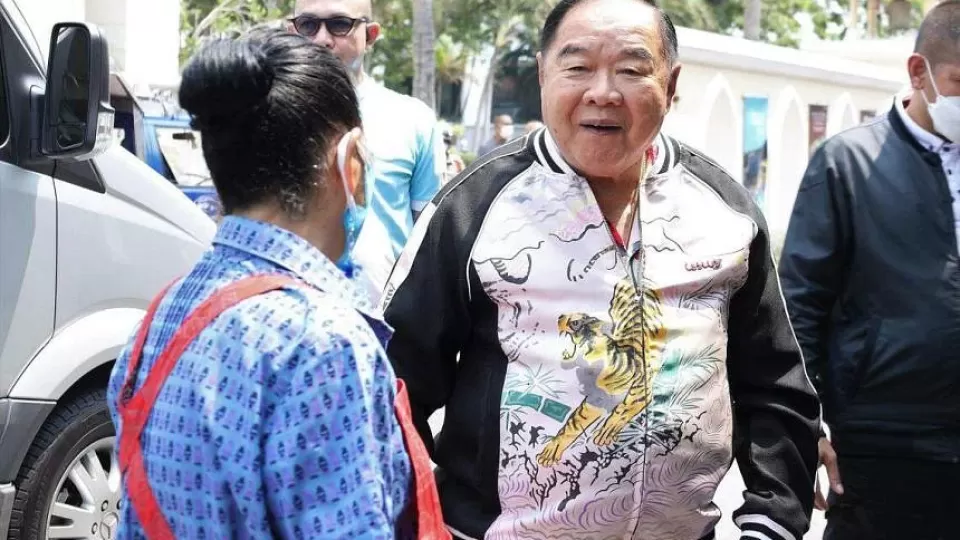March 20, 2023
BANGKOK – Deputy Prime Minister Prawit Wongsuwan has been turning heads of late, dressed in jeans, sneakers and trendy attire.
Earlier in March, the 77-year-old donned a jacket featuring a striking image of a highlighter-pink dragon and an orange tiger, designed by Thai fashion label Issue, while strolling on the streets.
Before that, he also showed off his stylish wardrobe, wearing a forest green Gucci bomber jacket, and on another occasion, sporting limited-edition orange and purple Hugo Boss threads.
Attire apart, the former army chief, who is linked with previous military coups, is also branding himself as a political peacemaker.
In its bid to retain power, the ruling Palang Pracharath Party (PPRP) which he leads is also positioning itself as a party seeking reconciliation, looking to rebuild democracy and end decades-long polarised politics in Thailand.
“The PPRP will bring love and unity to the nation. It’s time for us to stop fighting among ourselves. We, the Thai people, must join hands, so the country can move forward for the happiness of everyone,” he said at a rally on Saturday in Bangkok.
In 2014, Prime Minister Prayut Chan-o-cha came to power after overthrowing the elected government of then Prime Minister Yingluck Shinawatra. The 2019 General Election saw the emergence of the PPRP, which helped Mr Prayut to return as civilian prime minister when it nominated him for the premiership.
Mr Prayut and Mr Prawit were once close allies, along with Interior Minister Anupong Paochinda. All are former army chiefs who were part of the junta government after the 2014 coup. The trio, who often describe themselves as “brothers”, are dubbed the “Three Ps” by local media.
But this alliance came to an end when Mr Prayut announced his departure from the PPRP in December 2022 to join the new Ruam Thai Sang Chart party, which said it will support him in his goal for re-election.
On Friday, Mr Prayut said he had prepared an order to dissolve Parliament. It will take effect once it gets royal approval, paving the way for the general election that must happen within 60 days of the order. The election is expected to be held in May.
Mr Prawit will be the PPRP’s candidate for prime minister. And in the past months, he and the party have tried to cut ties with military-linked politics and Mr Prayut, mainly through a series of Facebook posts.
The “open letters” posted on Mr Prawit’s recently active social media page are purportedly his personal musings. In the lengthy posts, he positions himself as the bridge to bring about reconciliation and find common ground between the liberal and the conservative camps.
In one of his letters, he wrote: “Now, I understand the need to lead the country with a democratic regime.”
When asked by The Straits Times after Saturday’s rally if he thought the current government was considered democratic, he said: “Let the people decide if they want a change.”
There has also been a concerted attempt to show what party insiders say is Mr Prawit’s softer side, as a “kind” and “cute” personality, evident by the slogans displayed at Saturday’s rally.

Palang Pracharath executive Sakoltee Phattiyakul, who is in charge of the party’s election strategy in Bangkok, asks people to support party leader Prawit Wongsuwan (on screen). Mr Prawit’s nickname is “Pom” and the text behind (from left) says “Uncle Pom does it (work) for real”, “Uncle Pom is kind” and “Uncle Pom is cute”. ST PHOTO: TAN TAM MEI
This conciliatory and peacemaking tone has also been extended to competing political parties.
In his latest letter last Wednesday, Mr Prawit said that if he returns to Parliament, he will set up a committee to pool together the “decent” campaign policies by different parties and implement them as long as they benefit the public.
“This is the kind of politics I have in mind. A politics where there is no decisive winner or total loser,” he wrote.
The PPRP’s flagship campaign policies promise to raise welfare card payouts from 300 baht (S$11.80) to 700 baht per month, among other things. It also vows to distribute land to the poor, increase monthly payouts to the elderly and pass laws to reduce bribery.
But as the deadline for politicians to switch parties draws near, the PPRP has lost about half of the 116 MP seats it won in 2019. Earlier last week, several prominent members, with ministers among them, including from the Sam Mitr faction that Justice Minister Somsak Thepsutin and Industry Minister Suriya Jungrungreangkit are associated with, defected to the opposition Pheu Thai Party.
Trouble had been brewing within the party from the get-go, according to several sources with knowledge of the matter. Cracks in the party emerged shortly after the 2019 election when Mr Prawit and other PPRP politicians failed to secure significant Cabinet posts despite their support for Mr Prayut, who himself did not officially join the party.

Palang Pracharath leader Prawit Wongsuwan (centre) will be the party’s candidate for prime minister in the coming election. ST PHOTO: TAN TAM MEI
Tensions boiled over in late 2021 when then secretary general of the PPRP Thamanat Prompow was accused of plotting against Mr Prayut in a parliamentary no-confidence vote. He was removed from his post as deputy minister of Agriculture and Cooperatives and sacked from the party.
But Mr Thamanat rejoined the party in February, following Mr Prayut’s departure. Similarly, former senior PPRP members who left due to earlier disagreements have also returned.
While other parties have been careful about committing to a coalition government, the PPRP has shown its openness to collaboration, especially with its newfound image as a more liberal, democracy-seeking party. This positioning gives it room to manoeuvre a coalition deal with most major parties, including main opposition Pheu Thai.
The Pheu Thai Party, which could nominate the daughter of former premier Thaksin Shinawatra as one of its prime minister candidates, has repeatedly rebuffed such discussion. It has been polling well in voter surveys, and said it wants to win a “landslide” victory of 310 of the 500 MP seats in the hope of forming a one-party government.
A recent picture of Mr Prawit having a meal with members of other political parties, such as Bhumjaithai Party leader Anutin Charnvirakul, has triggered speculation of possible configurations of the next coalition government.

The Palang Pracharath Party, which is the leader of the coalition government, held a rally in Bangkok on Saturday to introduce the 33 constituency candidates for the party. ST PHOTO: TAN TAM MEI
Despite Mr Prawit’s age and concerns over his health as he sometimes needs help to walk, party insiders say that he is well-liked among party MPs as he is known to spend considerable time listening to their ideas and concerns.
And given his influence in the political sphere and reputation as an expert negotiator, the PPRP has a strong chance of returning to power, said political analyst Napon Jatusripitak, a visiting fellow at the ISEAS – Yusof Ishak Institute in Singapore.
Following the changes in election rules and a spate of high-level defections, Dr Napon believes the PPRP will not do as well as it did in 2019, but will still win enough seats to use as a bargaining chip in the next coalition government.
While Pheu Thai is expected to do well in the election, it might face some uncertainty in countering the 250 junta-appointed senators who hold some sway in the 750-member parliamentary vote for the prime minister post.
“Where Prawit ends up will depend on how far he pushes for the top job of PM. But it is more likely that he will ask for lucrative Cabinet posts for himself or his followers and play the role of kingmaker,” said Dr Napon.
But one thing is for sure, according to Dr Napon.
“Regardless of how the PPRP does, Prawit is still a potential ally for Pheu Thai. He will still have influence in negotiations,” he added.
- This is part of a series on Thailand’s key personalities and political parties. The Straits Times reports from the campaign trail ahead of the 2023 election.


